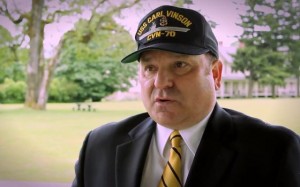Podcast: Download (Duration: 8:48 — 5.0MB)
Steven Schaljo sat down with us and shared his experience working at the Veterans Administration. He offers a first-hand view of the support services veterans can access here in Vancouver.
Schaljo is a work/study, part-time employee with the VA through the post 911 GI Bill. He’s completing his bachelor’s degree in business through Southern Illinois University while attending Clark College, and lives in Vancouver with his wife, Rita.
Schaljo also volunteers as the head coach for the West Side Soccer Club where his daughter Ria plays.
For more information on the Veterans Administration, visit its local website, call 360-696-4061 or stop by the local office at 1601 E. Fourth Plain Blvd.
–Transcript–
Schaljo: I work at the Vocational Rehab Center on the campus of the Vancouver, Washington Veteran’s Administration.
couv.com: How do we improve the quality of life of our disabled and homeless veterans here in Clark County?
Schaljo: Due to the referrals and the amount of walk-ins of that specific population of homeless and disabled veterans, we’re able to impact and change the lives of these veterans in many different ways. The three services we offer at the clinic are vocational, which is more job related, certainly all the counseling that comes with drug and alcohol counseling, psychological counseling, and the benefit counseling also. We do refer a lot of the veterans to the services in the community. But more specifically, once again, we deal with the job benefits, putting the veterans back to work.
Housing benefits is huge. A huge part of the services that we provide is the housing for the homeless veterans. The final one is the educational benefits. So really, it’s a three-tiered attack to solving the problem of a lot of these services that our veterans need.
Certainly, what we do first is to provide the shelter. We have a walk-in triage process, that we assess the veteran’s needs and try to immediately get them the life saving and the life continuing services. And then once we establish that, we start looking at the education, retraining, and job benefits to try and put our veterans back as viable, employable candidates in the workforce.
couv.com: Do you see a revolving door, or do you actually see people getting their lives together, or finding a better balance in their life?
Certainly, some of the veterans in need — both psychologically and just general survival needs — definitely are able to rehabilitate themselves. But there are quite a few with psychological problems — that will probably exist their entire lives — that are continuing need folks. And sometimes, they’ll go into a temporary employment where they’re actually able to complete the task and do the job, but once that job is over, we might have to reemploy them somewhere else. Because some of these are not career things we are able to do for folks. But certainly, we assist them, and there definitely has to be a buy-in from the veteran also, so they’re not a continual drain on the system.
When I say buy-in, they have to remain clean, because the counseling that comes with this is also medical related. We don’t perform, per se, the medical—besides the social counseling—but they are referred by doctors to us and vice versa.
couv.com: When you say clean, are you talking about drug free?
Yes, drug free. Whatever abuses that they may have had, and not all have this, but certainly a lot of the homeless folks do. They have to come to us and go on programs, and these programs are intertwined with some of the living assistance that is provided to them.
We have two full-time dwelling places on the campus. One is a huge apartment like complex called the SRO [sleeping room only]. It’s an assisted living type of environment for our rehabilitative veterans. One is more a temporary housing, probably used to house the veterans that aren’t as “in need.”
Some of the folks at that SRO— it’s a large apartment looking facility—they will be disabled their entire lives. We have cancer patients living there. So some of it isn’t psychological, it’s just mainly physically debilitating things that will affect them their whole life.
couv.com: Part of what you do is to help them find jobs?
Yeah, it’s basically based on their skill level. The veterans come with us with a background of work history, depending a lot of times on what they did in the military. But a lot of these folks have got out of the military, went on the job and then something happened in their life. It could be an injury. A lot of these veterans come to us almost 100% disabled physically. Now me, I’m kind of the front line support system when someone comes in the door. I route them to the appropriate counselor, so I’m not a counselor myself — I want to make that clear — but I’ve been working there for almost a year now, so I’m very quite versed, and being a former navy counselor I had some background in some of the counseling services.
couv.com: You contact businesses and try to set up jobs for the veterans? Walk me through that process.
Another program we have is called Veteran Industries which I was involved in, in my first six months on the job there at the VA. Veterans Industries works to partner and contract with area businesses to employ our veterans on a temporary to full time (hopefully) hiring program.
It’s a chance for them to, you know, meet the veteran, put the veteran to work at the agreed upon job requirements, at an agreed upon salary. The business is actually billed to the VA, the money doesn’t go directly to the veteran, and then we pay the veteran.
It’s a chance for the employer to employ veterans who are very employable, 100 percent certified to work in a public setting and to help them rehabilitate, get back to work. We hope that this would turn into full time.
Another major benefit to the employer, we provide everything, as far as the– if there’s tools required, if there’s boots required. We charge the client basically one dollar over the agreed upon salary and a lot of times the salary is minimum wage. We accept that. We certainly would like for the employer to give the veteran the same chance as anyone doing the same job. We ask for a comparable salary, but that is negotiable. And once the Veterans Industry contract is done, they can come back to us and we can seek further, or if you choose, you can employ them full time
couv.com: So, the benefit to the employer is they get to hire someone on a temporary basis, without making a full time commitment for long term. The financial benefit is that there is a negotiable rate, so since it is on a trial basis, it could take minimum wage, add a dollar?
The other fantastic benefit to the employers are the other benefits. We cover everything. Medical, insurance– if there is an injury on the job we take care of that on our own. It’s never on the employer. So really, the only thing you the employer handles is the training, the on the job training, hopefully the career placement into a full time job, and the salary that we negotiated.
couv.com: What kind of jobs have you seen veterans get?
Well, I have seen anything from general labor, for instance, providing security and fire detail and watches, to we actually employed a gentleman to go down and do relief down at the gulf disaster at the oil spill. He was a former manager in the army on logistics, so he was actually able to deploy, and go do wonderful things for British Petroleum.
We see a wide range, from information technology to say human resources, and the medical field; we get guys that were tank battalion commanders all the way through medical personnel. So as any military establishment goes we have a wide range of veterans and work available and experience to pull from.
couv.com: Tell me a little bit about your military background.
I was at first in aviation for half of my career, and then in counseling and career placement and reserve recruiting for the other half, so that ranged over a 20 year span in the Navy. Originally from Ohio, then to San Diego, to Portland, Oregon in the Navy, all of those were Navy commands.
Basically, I was told this was the place to be if you wanted to raise a family – the schools, and the economical impact, and the benefits of living in Vancouver. So, my family, we bought our first home and I retired (from the Navy) and I love it here.










